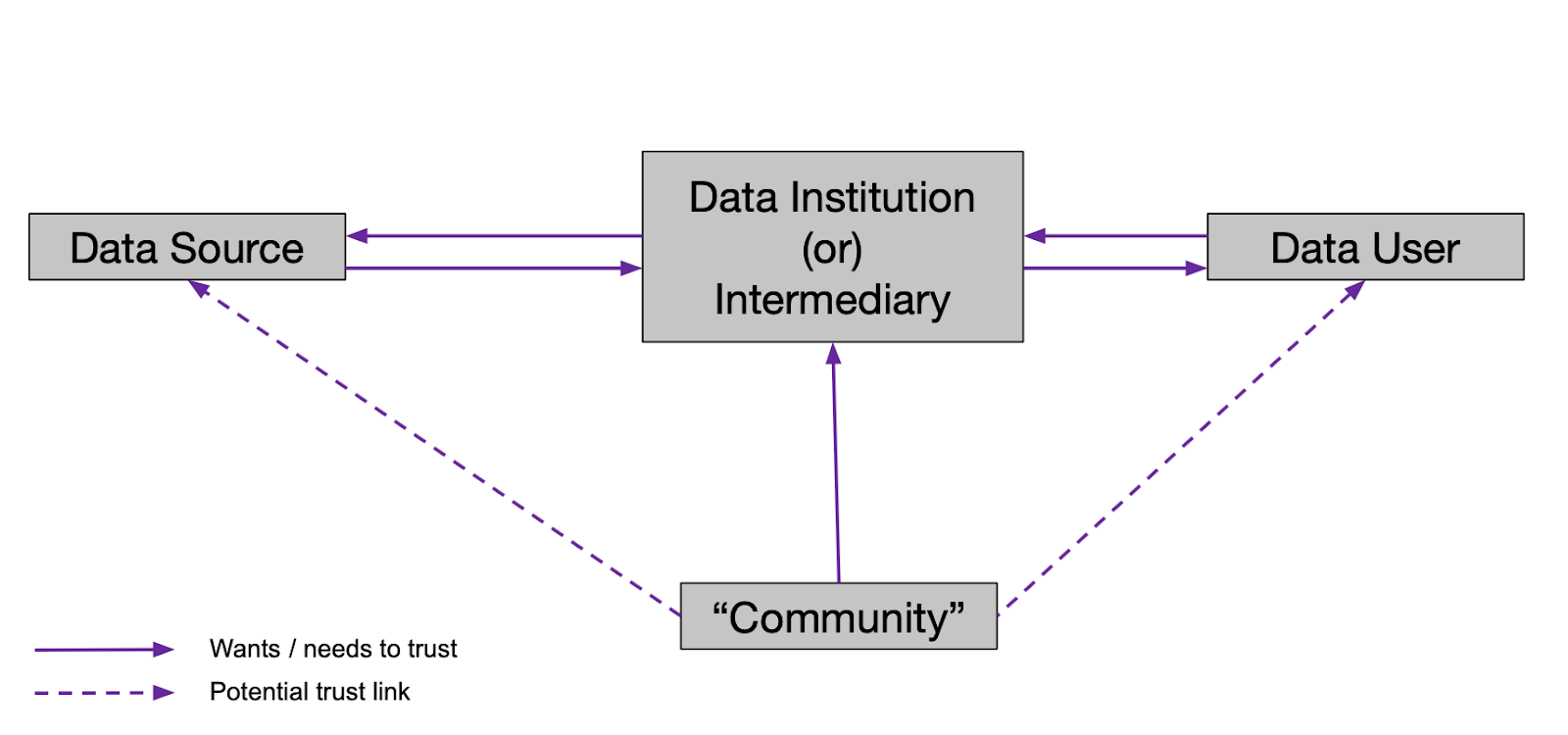
We’re continuing our research on the Building trust through audit and certification project within the ODI’s R&D programme. This worknote is an update on the different streams within the project.
ODI research
Secondary research
For a data ecosystem to function well, different organisations need to trust each other to perform certain actions. A data source may trust a ‘data intermediary’ (those who sit between data providers, users and other stakeholders) to securely store data, a data user may trust an intermediary to obtain data legally, and the wider community may trust all actors to uphold certain ethical principles.

In this stream, we’re researching how trust relationships work in practice and how they’re helped by external assessments. We’ll study specific data ecosystems in the finance, health and mobility sectors and how they use assessments such as certifications, audits or standards.
We’ll carry out desk research on organisations in these data ecosystems. Hoping to answer questions such as:
- What do the organisations in these data ecosystems trust each other to do?
- What assessments are used in this ecosystem? Are they legal, technical, financial or something else?
- Who are the audience of the assessments?
- Are there any important actions that should be externally assessed but currently aren’t?
- If needed, could we help them develop any new assessments?
Are you in a mobility, finance or health organisation that shares data with others? Please get in touch.
User research
Part of the team's research is focusing on speaking to people working in organisations within the health, finance and mobility sectors.
We will conduct user research interviews where we will seek to understand:
- How organisations currently use standards and certification
- What these standards or certifications cover
- Is it mandatory to adhere to these or are they voluntary
Assessments, certifications and standards vary from sector to sector. Understanding the process, the necessity or curiosity an organisation might have, the value of the process and the outcome and how organisations view trust internally and externally when looking at partners to work with will be fascinating to learn, discuss and probe further.
Alongside questions around standards and certifications, we intend to ask questions about:
- What does ‘trust’ mean to the organisations?
- What value do they think being certified or having been assessed has for their organisation?
- The pain points, challenges and needs for certification and assessment within the sector and where there are gaps.
We will update on the process and our findings in our next worknote.
Research conducted by Oxford Insights
Research aimed at professional services firms
For the interviews outlined above we will mainly be speaking to organisations from our target sectors and focusing on finance, health and mobility. But as a means of complementing these use case and sector-specific interviews, we are also reaching out to professional services firms to understand how their clients, such as engineers, doctors and lawyers, seek to demonstrate their trustworthiness in handling data and what their clients think about the need/usefulness of standards, certifications and auditing.
The interviews will explore similar terrain as those outlined above, such as:
- Whether professional services companies adhere to any internal or external standards and norms when working with data, other than those that they are legally obligated to adhere to.
- Whether they feel certification would be a good way for their clients to build and demonstrate their trustworthiness when working with data
- Whether they envision a role for their company in crafting, developing or operating those certification schemes.
In addition to the perceived value of certification schemes, we are interested in understanding whether these firms have any concerns about the various certification models or about certification in general. For instance, are they concerned that, when priced too high, certification schemes may actually restrict some smaller people or companies from entering a market – especially if those certifications are mandatory.
If you work for a professional services firm, or if you have experience helping industry professionals build or demonstrate their trustworthiness around data, please get in touch with us.
Research into certification and accreditation schemes
This strand of research was conducted on our behalf by Oxford Insights and strove to better understand the process involved in crafting, developing and operating a certification scheme.
We interviewed organisations that are currently operating certification or accreditation schemes. Within these interviews we sought to understand:
- Why these schemes were set up
- The steps involved in bringing a standard or certification scheme to market
- The package of services offered by those organisations - eg which aspects of an organisation they assess or certify, the methods they use to do so and the types of kitemarks or seals they offer.
We are also interested in exploring how/if these types of assessment and certification schemes generate revenue for the bodies that oversee them. By gathering information about the business models of a number of accrediting/certifying schemes we will develop a simple financial model to provide guidance for organisations looking to develop similar schemes or offerings in the future.
One of the most interesting questions we explored within this strand of research was whether there are any restrictions on a certifying body offering products or consulting services alongside a certification scheme. Some of the certification schemes we explored require a strict separation between any consulting and certification; other schemes allow a certifying body to assess an organisation they have consulted for, so long as the certifying body undergoes regular assessments to ensure consistency of standards and fair play.
Economic modelling of trust in data ecosystems
We are currently running an invitation to tender (with proposals due 17 August 2020) for an expert team to conduct an exercise in economic modelling.
A lot of our research builds on an assumption that the lack of trust between actors in a data ecosystem ( for example lack of trust between data holders and potential data users) is a barrier to the effective and trustworthy collection, sharing and use of this data. We have plenty of anecdotal and qualitative evidence that it is a correct hypothesis, but we were keen to validate it and possibly understand the magnitude of its impact.
We are therefore seeking the services of experts to help us quantify the economic impact of increased trust in a data ecosystem, or, as a corollary: 'What is the global impact created by the lack of trust between data subjects, data stewards and data users?'.